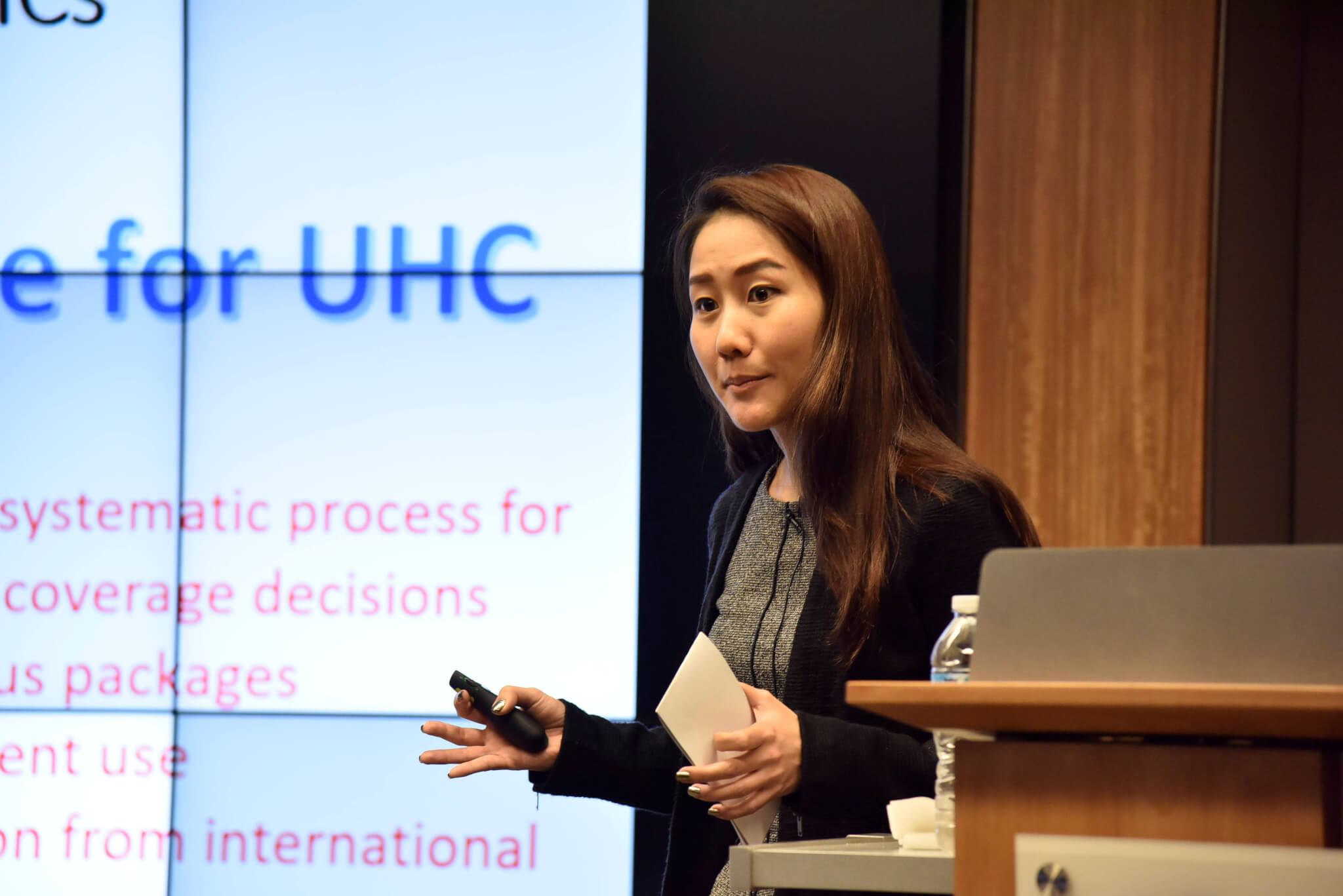Indonesia
- The Indonesian government is strongly committed to UHC and acknowledges health technology assessment (HTA) as an important tool for priority-setting and making decisions about what is covered for whom under UHC. Since 2013, iDSI collaboration led by HITAP with national authorities including the HTA Committee and the Social Security Management Agency for the Health Sector (BPJS) has been instrumental in driving the policy momentum for HTA. These efforts will be critical to ensuring the long-term financial sustainability of Jaminan Kesehatan Nasional, JKN, one of the world’s largest single payer social health insurance schemes, and to mitigate the rising burden of non-communicable diseases facing Indonesia.
Our Impact
iDSI has supported:
Identified potential US$31.9m annual savings from supporting HTA studies
iDSI has initially provided technical support to the HTA Committee under the Ministry of Health since its establishment by ministerial decree, and increasingly engaged with the potential users of HTA evidence – including BPJS, who is responsible for administering JKN. iDSI also played a coordinating role between various development partners with a stake in HTA including Australia’s Department of Foreign Affairs and Trade, PATH, Access and Delivery Partnership (ADP), and WHO. In 2019 and 2020, iDSI has been continuing to support HTA institutionalisation and local efforts to strengthen the network of HTA suppliers, including the University of Padjadjaran on one of the HTA topics with ADP funding. iDSI is also supporting the knowledge sharing efforts of Indonesian colleagues domestically and internationally through the ADP knowledge exchange webinar series.
Building local HTA capacity to tackle non-communicable disease burden
In collaboration with iDSI, the HTA Committee and Indonesian academic institutions completed a total of 8 HTA studies since 2014 spanning a range of priority clinical topics including detection, prevention and treatment of diabetes, dialysis for end-stage kidney disease, high-cost cancer drugs, and other non-communicable diseases. iDSI’s end-to-end support covered the topic selection process, through scoping and definition of research questions, literature reviewing and primary data collection, economic evaluation, synthesis and identifying policy recommendations, stakeholder consultation, and dissemination. iDSI employed a variety of approaches to capacity building, including:
- Training workshops coupled with intense coaching and handholding by HITAP for Indonesian researchers on the specific HTA studies being conducted.
- Experts from Mahidol University provided additional technical input in training workshops, with topics being chosen based on local teams’ demand, and sustenance provided in form of reading materials, exercises, and regular teleconferencing.
- HITAP hosted interns from the University of Indonesia who conducted HTA studies on topics chosen by the HTA Committee and observed high-level policy meetings in Thailand (for instance drug committee meetings on price negotiation) to gain an understanding of how HTA is used in practice to inform and shape policy and purchasing decisions.
- Opportunities for local agencies such as the HTA Committee and the Indonesian Technical Advisory Group on Immunization (ITAGI), who became interested in using HTA to inform vaccine decisions, to present their work at regional and international forums such as the HTAsiaLink and a workshop at the National University of Singapore in 2019.
Impact
By implementing all of the HTA Committee recommendations produced with iDSI assistance through 2016-17, the Indonesian government could generate potential US$31.9m annual savings from the JKN budget. If reinvested into the health system, this could avert an estimated 44,787 DALYs in the Indonesian population.
Some of these gains are beginning to be realised. In October 2018, BPJS issued a decision to remove cetuximab and bevacizumab, two high-cost cancer drugs, from the formulary which means they can no longer be reimbursed on JKN for certain colorectal cancers. This major policy impact was a direct result of the iDSI-supported, locally generated HTA studies which found both drugs to be poor value for money in the Indonesian context.
Earlier HTA studies undertaken with iDSI support in 2014-15 are also beginning to see policy impact. For instance, the evaluation of the WHO Package of Essential Non-communicable Disease interventions (PEN) has shaped the national protocol for diabetes screening, whereby the starting age will rise from 15 to 45 years and in turn result in more than double the existing individuals receiving screening coverage, from 28% to 63% of the target population. And the evaluation of pulmonary arterial hypertension treatments found sildenafil (an “off-label”, or unlicensed medicine for the specific indication) to be both more effective and less costly than the on-label treatment option reimbursed under JKN. The authorities expedited the registration process for sildenafil for pulmonary arterial hypertension as a result, and the ensuing policy discussions facilitated by iDSI also paved the way for wider policy changes so that drug registration and reimbursement become better aligned.
iDSI has supported the move of HTAC to promote the use of peritoneal dialysis instead of hemodialysis for JKN—UHC program managed by BPJS. (Read more here.) and on the recommendation to use more HTA for JKN (Read more here.)
“
With 200 million citizens in the scheme, BPJS needs to be a more strategic purchaser… to determine whether to pay for the things we have to pay, or what providers are asking to be paid.Pak Budi Hidayat Professor of Health Economics and Health Insurance at the University of Indonesia and a member of HTA Committee, Indonesia
Key Reads
Institutionalizing Evidence-Informed Priority Setting for Universal Health Coverage: Lessons From Indonesia https://pubmed.ncbi.nlm.nih.gov/32513029/
Policy Brief: Health Technology Assessment on Insulin Analogue as Treatment for Type 2 Diabetes in Indonesia https://www.idsihealth.org/wp-content/uploads/2018/12/Final-PB-insulin-for-web_28112018.pdf
Policy Brief: Using Health Technology Assessment to address inefficient and unequal use of Nilotinib across Indonesia https://www.idsihealth.org/wp-content/uploads/2018/12/PB_Nilotinib-Issue-9.pdf
Policy Brief: Should high-cost bevacizumab used for metastatic-colorectal cancer (mCRC) treatment in JKN in Indonesia? http://www.globalhitap.net/wp-content/uploads/2019/01/PB_Bevacizumab-2019.01.14_final.pdf
Policy Brief: Cetuximab as an adjuvant therapy for metastatic colorectal cancer: does the high cost outweigh the benefit for saving patient’s life? http://www.globalhitap.net/wp-content/uploads/2019/01/PB-cetuximab-31_1_2019_Final.pdf
Policy Brief: Off-label medicines: Rational or irrational? http://www.globalhitap.net/wp-content/uploads/2017/08/PB-off-label-Medicine-FINAL.pdf
Policy Brief: Health Technology Assessment on Sildenafil as Treatment for Pulmonary Arterial Hypertension (PAH) http://www.globalhitap.net/wp-content/uploads/2017/05/PB_PAH_26_Apr_2017-for-web.pdf
One Step Back, Two Steps Forward: An Economic Evaluation of the PEN Program in Indonesia http://www.tandfonline.com/doi/pdf/10.1080/23288604.2015.1124168
Economic evaluation of policy options for dialysis in end-stage renal disease patients under the universal health coverage in Indonesia http://journals.plos.org/plosone/article?id=10.1371/journal.pone.0177436
Strengthening policy processes and methods for HTA
Impact
The awareness and acceptability of HTA by the policymakers has certainly grown. In the past (iDSI Phase 1, 2014-15), iDSI supported the completion of four HTA studies which were financially supported by external funders. Since 2016 however, the Indonesian HTA Committee led on producing four HTA studies, drawing on the technical capacity of Indonesian universities, and directly addressing the policy priorities and with the financial support of BPJS. In 2019, BPJS has commissioned another round of HTA studies. This is a testimony to the growing receptiveness to HTA among Indonesian policymakers and its use to inform sound decision-making.
The HTA methods guide, which has received comments from local and international partners including PATH, is now published in Bahasa and English, with the latter being available on the iDSI Guide to Economic Analysis and Research (GEAR) Online Resource. It sets standards for the conduct and reporting of economic evaluations in Indonesia.
Key Reads
- Itad 2018 MEL Indonesia country review Final Report iDSI Country Learning Review: Indonesia | Documents | F1000Research
- iDSI Viewpoints Indonesia: From Collaboration to Call for Action http://www.globalhitap.net/wp-content/uploads/2018/12/iDSI_Booklet_complete_15.1.19.pdf
- Health Technology Assessment (HTA) Guideline: Indonesian Health Technology Assessment Committee (InaHTAC), Ministry of Health, Republic of Indonesia http://www.gear4health.com/uploads/files/file-15-5a441f38c8992.pdf

Spotlight on: iDSI, Sida and CHAI session on health financing towards Universal Health Coverage at Global Symposium on Health Systems Research
31.10Impact in Indonesia: two low value cancer drugs to be removed from national medicines list
18.10